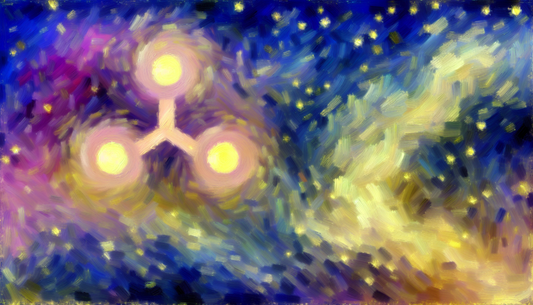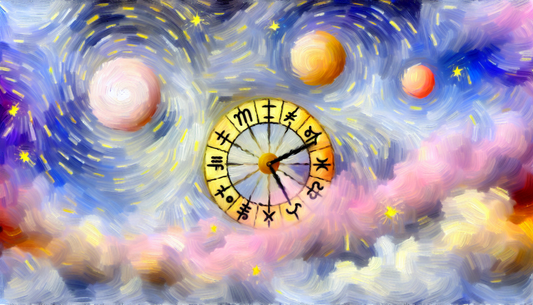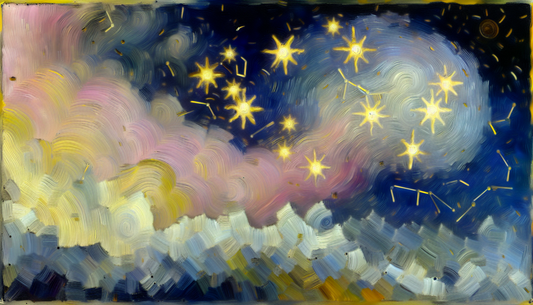Astrology and religion have peacefully journeyed side by side through the ages, often weaving their wisdom into each other’s tapestry. From the mystic rituals of ancient civilizations to the soulful practices of today’s seekers, both have lovingly sought to illuminate the mysteries of human existence, the vast cosmos, and our beautiful place within it. Let’s explore the magical intersections, shared themes, and unique distinctions that shape how we understand the universe - and ourselves.
The Historical Connection
The origins of astrology stretch back thousands of years to ancient civilizations like the Babylonians, Egyptians, and Greeks, where the stars and planets were seen as vibrant expressions of the divine. These celestial bodies weren’t just lights in the sky - they were sacred symbols influencing the rhythms of life and the spiritual fabric of society. For Babylonian priests, astrology was a sacred act, a way to honor and communicate with their gods through the patterns above.
Ancient mythologies, rich with wonder, often entwined human stories with celestial wonders. The Greeks, for example, personified stars and constellations as gods and heroes, stories that continue to inspire art and spirituality today. Even modern religious traditions carry echoes of this starry legacy, reminding us how deeply connected we are to the cosmos.

Astrology in Major Religions
Across the world’s rich spiritual landscapes, astrology takes on vibrant and varied forms. In Hinduism, Jyotish (or Vedic astrology) is a cherished thread within daily life and sacred ceremonies, gently guiding choices from relationships to rites of passage. The positions of the planets at our birth are lovingly seen as keys unlocking our karmic journey and soul’s purpose.
Meanwhile, in the Abrahamic faiths - Judaism, Christianity, and Islam - the relationship with astrology is more nuanced. While traditional teachings often approach it with skepticism, hinting that divine will transcends star patterns, fascinating glimpses appear here and there, like the Magi following the Star of Bethlehem. Additionally, mystical and esoteric paths within these traditions continue to hold a quiet, curious reverence for astrological wisdom.

The Philosophical Underpinnings
Both astrology and religion invite us to envision the cosmos as a beautifully interconnected system, where the dance of planets and stars gently influences earthly life. Ancient Greek philosophers like Ptolemy shared this vision, portraying a geocentric universe pulsating with divine energy, where each celestial body reflected facets of human nature and destiny. This poetic philosophy resonates with many religious teachings about divine influence and purpose.
Astrology offers a warm, reflective mirror into our inner worlds, much like religious teachings do. Through the celestial configurations, we receive guidance - illuminating our personal strengths and challenges, and encouraging self-awareness and growth, akin to the spiritual lessons found in faith traditions.
Common Themes: Destiny, Free Will, and Human Experience
At the heart of astrology and religion lies a tender dance between destiny and free will. Many faith stories suggest that while divine or cosmic forces set the stage, we hold the pen to our own story. Astrology echoes this balance, suggesting that knowing the stars’ influences empowers us to make conscious, heartfelt choices.
These shared themes affirm that astrology doesn’t oppose religion but rather gently complements it, offering nurturing guidance alongside spiritual faith. Together, they speak to our beautiful human longing - to understand the unknown, find meaning, and navigate life’s moments with grace and hope.
Modern Perspectives and New Age Beliefs
Today, astrology shines brightly, embraced by many who weave it into diverse spiritual journeys, especially within New Age circles. This blending honors personal intuition and universal mystery, creating spaces for healing, connection, and soulful discovery.
The blossoming of horoscopes, intuitive apps, and community workshops reflects astrology’s enduring role in offering comfort and insight amid modern life's whirlwind. For many, it’s far more than entertainment - it’s a heartfelt path to awaken self-love, awareness, and spiritual growth.
Conclusion: Finding Harmony
The beautiful, intertwined journey of astrology and religion reveals humanity’s timeless quest to connect with something greater - our true essence and the universe’s loving embrace. As these traditions continue to evolve and blend, they inspire us to explore life’s mysteries with openness, compassion, and wonder.
Astrology and religion are not rivals but kindred companions, each offering unique lenses to explore meaning, purpose, and the divine. For anyone seeking a deeper spiritual connection, the dance between stars and faith promises to enrich and illuminate the soul’s path with warmth and wisdom for years to come.















